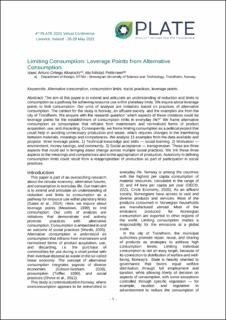Limiting consumption: leverage points from alternative consumption
Chapter
Published version
Permanent lenke
https://hdl.handle.net/11250/2981870Utgivelsesdato
2021Metadata
Vis full innførselSamlinger
- Institutt for design [1121]
- Publikasjoner fra CRIStin - NTNU [38015]
Originalversjon
10.31880/10344/10249Sammendrag
The aim of this paper is to extend and articulate an understanding of reduction and limits to consumption as a pathway for achieving resource use within planetary limits. We inquire about leverage points to limit consumption. Our units of analysis are initiatives based on practices of alternative consumption. The context for the study is Norway, an affluent society, and the examples are from the city of Trondheim. We enquire with the research question “which aspects of these initiatives could be leverage points for the establishment of consumption limits in everyday life?” We frame alternative consumption as consumption that refrains from mainstream and normalized forms of product acquisition, use, and discarding. Consequently, we frame limiting consumption as a political project that could help in avoiding unnecesary production and waste, which requires changes in the interlinking between materials, meanings and competences. We analyze 11 examples from the data available and propose three leverage points. 1) Technical knowledge and skills — social learning. 2) Motivation — environment, money savings, and community. 3) Social acceptance — transgression. These are three aspects that could aid in bringing about change across multiple social practices. We link these three aspects to the meanings and competences and to the appropriation of production. Autonomy in defining consumption limits could result from a reappropriation of production as part of participation in social practices.
